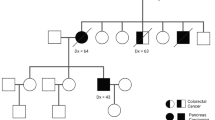Abstract
Familial pancreatic cancer (FPC) is a rare tumour syndrome and its underlying major gene defect is still unknown. Recently, CHEK2 has been identified as multi-organ cancer susceptibility gene associated with a predisposition to breast, prostate and colon cancer. Since these cancers also are associated with some FPC families, we have analysed 35 index patients of German FPC families for CHEK2 mutations. The CHEK2 * 1100delC mutation was found in 1 (3%) of 35 FPC families. Given the low expected mutation rate of up to 1.4% for CHEK2 * 1100delC in the European population our data are suggestive for possible contribution of CHEK2 mutations to a small subset of FPC.
Similar content being viewed by others
References
Bartsch DK, Kress R, Sina-Frey M, Grützmann R, Gerdes B, Pilarsky C et al (2004) Prevalence of familial pancreatic cancer in Germany. Int J Cancer 110:902–906
Hemminki K, Li X (2003) Familial and second primary pancreatic cancers: a nationwide epidemiologic study from Sweden. Int J Cancer 103:525–530
Rieder H, Bartsch DK (2004) Familial pancreatic cancer—a review. Familial Cancer 3:69–74
Greenhalf W, McFaul CD, Earl J, Howes N, Neoptolemos JP, Kress R et al (2006) Anticipation in familial pancreatic cancer. Gut 55:252–258
Murphy KM, Brune KA, Griffin C, Sollenberger JE, Petersen GM, Bansal R, Hruban RH, Kern SE (2002) Evaluation of candidate genes MAP2K4, MADH4, ACVR1B, and BRCA2 in familial pancreatic cancer: deleterious BRCA2 mutations in 17%. Cancer Res 62:3789–3793
Hahn SA, Greenhalf B, Ellis I, Sina-Frey M, Rieder H, Korte B et al (2003) BRCA2 germline mutations in familial pancreatic carcinoma. J Natl Cancer Inst 95:214–221
Bartsch DK, Sina-Frey M, Lang S, Wild A, Gerdes B, Barth P et al (2002) p16 germline mutations in familial pancreatic cancer. Ann Surg 236:730–737
Lynch HT, Brand R, Hogg D, et al (2002) Phenotypic variation in eight extended CDKN2a germline mutation familial atypical multiple mole melanoma-pancreatic carcinoma-prone kindreds. Cancer 94:84–96
Nej K, Bartsch DK, Sina-Frey M, Rieder H, Hahn SA, Lubinski J (2004) The NOD2 3020insC mutation and the risk of familial pancreatic cancer? Hered Cancer Clin Prac 2:149–150
Bartsch DK, Fendrich V, Slater EP, Sina-Frey M, Rieder H, Greenhalf W et al (2005) RNASEL germline variants ant its association with pancreatic cancer. Int J Cancer 117:718–722
Rogers CD, van der Heyden MS, Brune K, Yeo CJ, Hruban RH, Kern SE, Goggins M (2004) The genetics of FANCC and FANCG in familial pancreatic cancer. Cancer Biol Ther 12:167–169
Zhou BB, Elledge SJ (2000) The DNA damage response: putting checkpoints in perspective. Nature 408:433–439
Matsuoka S, Huang M, Elledge SJ (1998) Linkage of ATM to cell cycle regulation by the Chk2 protein kinase. Science 282:1893–1897
Vahteristo P, Bartkova J, Eerola H, Syrjäkoski K, Ojala S, Kilpivaara O et al (2002) CHEK2 genetic variant contributing to a substantial fraction of familial breast cancer. Am J Hum Genet 71:432–438
Chebab NH, Malikzay A, Appel M, Halazonetis TD (2000) Chk2/hCds1 functions as a DNA damage checkpoint in G (1) by stabilizing p53. Genes Dev 14:278–288
Shieh SY, Ahn J, Tsmai K, Taya Y, Prives C (2000) The human homologs of checkpoint kinase Chk1 and Cdsl (Chk2) phosphorylate p53 at multiple DNA damage-inducible sites. Genes Dev 14:289–300
Meijers-Heijboer H, van den Ouweland A, Klijn J, Wasielewski M, de Snoo A, Oldenburg R et al (2002) Low-penetrance susceptibility to breast cancer due to CHEK2 * 1100delC in noncarriers of BRCA1 and BRCA2 mutations. Nat Genet 31:55–59
Cybulski C, Huzarski T, Gorski B, Masojc B, Mierzejewski M, Debniak T et al (2004) A novel founder mutation is associated with increased prostate cancer risk. Cancer Res 64:2677–2679
Dong X, Wang L, Taniguchi K, Wang X, Cunningham JM, McDonnell SK Quian C et al (2003) Mutations in CHEK2 associated with prostate cancer risk. Am J Hum Genet 72:270–280
Seppäla EH, Ikonen T, Mononen N, Autio V, Rökman A, Matikainen MP et al (2003) CHEK2 variants associated with hereditary prostate cancer. Br J Cancer 89:1966–1970
Cybulski C, Gorski B, Huzarski T, Masojc B, Mierzejewski M, Debniak T et al (2004) CHEK2 is a multiorgan cancer susceptibility gene. Am J Hum Genet 75:1131–1135
Bartsch DK, Sina-Frey M, Ziegler A, Hahn SA, Przypadlo E, Kress R et al (2001) Update of familial pancreatic cancer in Germany. Pancreatology 1:510–516
Rieder H, Sina-Frey M, Ziegler A, Hahn SA, Przypadlo E, Kress R et al (2002) German National Case Collection of familial pancreatic cancer- clinical-genetic analysis of the first 21 families. Onkologie 25:262–266
Lynch HT, Smyrk T, Kern SE, Hruban RH, Lightdale CJ, Lemon SJ et al (1996) Familial pancreatic cancer: a review. Semin Oncol 23:251–275
Bell DW, Varley JM, Szydlo TE, Kang DH, Wahrer DC, Shanon KE et al (1999) Heterozygous germ line hCHK2 mutations in Li-Fraumeni syndrome. Science 286:2528–2531
Vahteristo P, Tamminen A, Karvinen P, Eerola H, Eklund C, Aaltonen LA et al (2001) P53, CHK2, and CHK1 genes in Finnish families with Li-Fraumeni syndrome: further evidence of CHK2 in inherited cancer predisposition. Cancer Res 61:5718–5722
Meijers-Heijboer H, Wijnen J, Vasen H, Wasielevski M, Wagner A, Holestelle A et al (2003) The CHEK21100de1C mutation identifies families with a hereditary breast and colorectal cancer phenotype. Am J Hum Genet 72:1308–1314
Author information
Authors and Affiliations
Corresponding author
Additional information
This work was supported by grant 70-3085-Ba4 from the Deutsche Krebshilfe to DKB
Rights and permissions
About this article
Cite this article
Bartsch, D.K., Krysewski, K., Sina-Frey, M. et al. Low Frequency of CHEK2 Mutations in Familial Pancreatic Cancer. Familial Cancer 5, 305–308 (2006). https://doi.org/10.1007/s10689-006-7850-4
Received:
Accepted:
Published:
Issue Date:
DOI: https://doi.org/10.1007/s10689-006-7850-4




